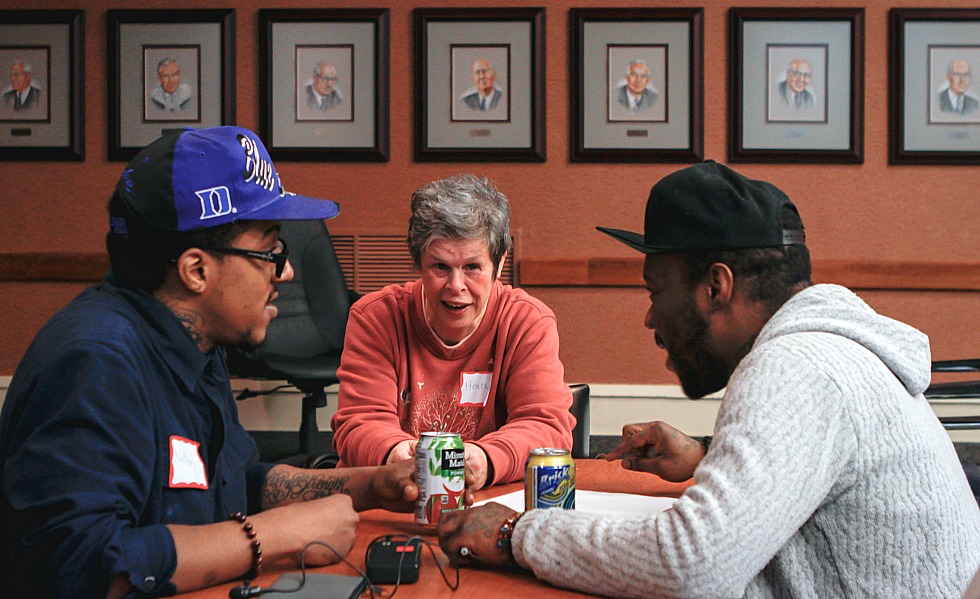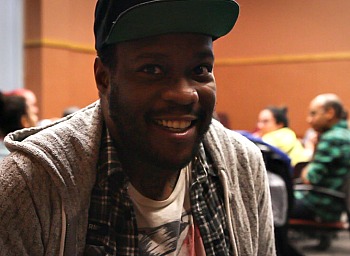McMaster study looking at ways to prevent homelessness among youth with intellectual, developmental disabilities

McMaster researchers are working with six co-researchers with intellectual and developmental disabilities and experiences of homelessness (three of which are pictured above) on a project aimed at finding ways to prevent youth with intellectual and developmental disabilities from falling through the cracks.
BY Erica Balch
February 13, 2017
O’Neil Allen was still a teenager when he found himself homeless on the streets of Toronto.
He had grown up in child welfare care and struggled in school for years with a learning disability.
After turning 18, he was unable to support himself or find the services he needed and spent the next four years seeking refuge in homeless shelters where he says he met countless youth with intellectual or developmental disabilities, just like him.
Now age 27 and enrolled in an adult upgrading program at George Brown College, Allen, is working with McMaster researchers to gather data they hope will help prevent other youth with intellectual or developmental disabilities from falling through the cracks.
Allen is a co-researcher on Partnering for Change, a project led by McMaster’s Ann Fudge Schormans and Stephanie Baker Collins.
Taking place in Toronto, Hamilton and Niagara, the project is bringing together– for the first time – representatives from multiple sectors, service agencies, frontline workers, co-researchers with experiences of homelessness and disability, and youth themselves to study the intersection of intellectual/developmental disability and homelessness.
“Homeless youth have interrupted and intermittent connections to education and employment,” says Baker Collins, an associate professor in the School of Social Work. “If these youth also have a disability which is not addressed or diagnosed, these issues are compounded.”
“We know that people with disabilities are overrepresented in the homeless population,” adds Fudge Schormans, also an associate professor in the School of Social Work. “But we don’t know how many youth labeled with intellectual or developmental disabilities are homeless, what services are available to them, how agencies are responding to youth looking for services, or what the experiences of youth are like. The goal of this project is to collect that data.”

To do this, Fudge Schormans and Baker Collins have formed advisory committees in Toronto, Hamilton and Niagara that include representatives from the employment, education, housing and disability sectors.
They are working with local agencies to develop ways to track the numbers of youth with intellectual/developmental disabilities seeking services in these communities. They are also conducting interviews with “key informants,” such as frontline workers, in each sector to understand how youth interact with these agencies.
But Fudge Schormans and Baker Collins say the most critical component of the project is to hear from youth themselves. That’s where Allen comes in.
He and six other non-academic co-researchers from the three communities – all of whom have experienced intellectual/developmental disability and homelessness –are visiting shelters to interview youth, listen to their stories, and document the barriers they face.
“Co-researchers bring expertise that academic researchers don’t have,” explains Baker Collins. “They bring a familiarity with the experiences of the youth we are interviewing and can establish rapport that encourages youth to participate and gives them a safe space in which to do so.”
“I’ve seen the eyes of the kids,” says Allen. “We loosen the mood for them. They answer our questions more easily. We’ve been able to get information we wouldn’t have been able to get with just academics doing the research.”
“It’s not easy,” he adds. “It brings me back to the time when I was homeless and struggling with school, but I’m happy to be a part of the project because I know the results we’re getting will be a step towards change.”
Fudge Schormans and Baker Collins say gathering this data is only the beginning.
They are hoping to expand the project to other Ontario communities and, using the data collected in this study, continue working with the members of the advisory groups to find ways to address gaps in service and better serve youth with intellectual/developmental disabilities.
“We want to figure out how sectors and services can work more closely to help youth find routes to the services they need and prevent them from becoming homeless in the first place,” says Fudge Schormans.
*Partnering for Change was funded through a Social Sciences and Humanities Research Council (SSHRC) Development Grant.
Hear more from O’Neil Allen:

